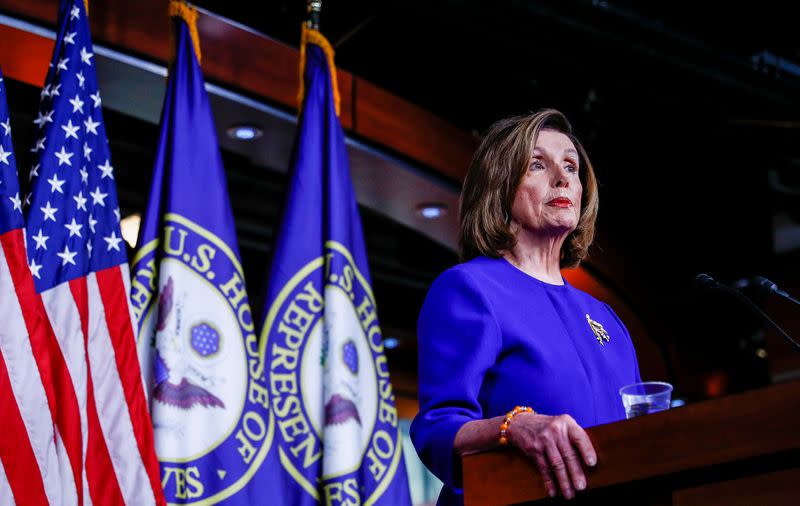U.S. Democrats to press for impeachment witnesses throughout trial
By David Morgan and Lisa Lambert
WASHINGTON (Reuters) - U.S. Democrats on Thursday vowed to keep fighting to hear witnesses at President Donald Trump's pending impeachment trial in the Republican-controlled Senate, even as their drive to exact a guarantee ahead of the proceedings appeared futile.
Senate Democratic leader Chuck Schumer said he will press Republicans to accept four witnesses, including John Bolton, Trump's former national security adviser, even if the Senate rejects testimony at the start of the trial to determine whether Trump should be convicted of abusing his power and obstructing Congress over Ukraine.
"Those votes at the beginning of the trial will not be the last votes on witnesses and documents. Make no mistake, we will continue to revisit the issue," Schumer said on the Senate floor.
Schumer, who needs only four of the 100-seat Senate's 53 Republicans to join Democrats on the witness question, could succeed by pressuring vulnerable Republicans such as Senator Susan Collins and Senator Cory Gardner, who face re-election challenges in swing states in November.
Without witnesses, Democrats fear Senate Republicans could move quickly to dismiss the charges against Trump.
But securing witnesses could also open a Pandora's box for Democrats. Trump has said he would like to hear from former Vice President Joe Biden, his businessman son Hunter Biden, House Intelligence Committee Chairman Adam Schiff and the anonymous whistleblower whose complaint launched the impeachment inquiry.
Trump also has said he might try to block Bolton from testifying.
"When we start allowing national security advisers to just go up and say whatever they want to say... We can't do that," he told reporters at the White House.
The timing of Trump's Senate trial remained up in the air, as House of Representatives Speaker Nancy Pelosi said she wants first to see Senate Republican Leader Mitch McConnell's trial plan before sending the impeachment articles to the Senate.
"I'll send them over when I'm ready, and that will probably be soon," she told a news conference.
With some Senate Democrats calling for the trial to move forward, expectations have risen for a break in the impasse.
"I want to give Speaker Pelosi the time to make the right judgment in terms of reporting this to the Senate. I expect it to happen soon," Senator Richard Durbin, the chamber's No. 2 Democrat after Schumer, told Reuters.
McConnell told other Republican lawmakers he expects to get the articles as soon as Friday, which would set up a trial for next week, according to a source familiar with the discussion.
House Democrats said they have seen no indication from Pelosi on when the articles could move to the Senate. Some said they do not expect that until next week.
The Democratic-controlled House impeached Trump in December on charges that he abused his power for personal gain by pressuring Ukraine to launch a corruption investigation of Joe Biden, a leading contender for the Democratic nomination to face Trump in November's presidential election.
The House also charged him with obstructing Congress by directing administration officials and agencies not to cooperate with the impeachment inquiry.
Trump says he did nothing wrong and has dismissed his impeachment as a partisan bid to undo his 2016 election. He is likely to be acquitted, as no Republicans have voiced support for ousting him from office.
McConnell wants to consider calling witnesses well after the proceedings begin and has support from enough Republican lawmakers to adopt his plan without backing from Democrats.
"This conversation is over," McConnell said on the Senate floor. "We are not ceding our constitutional authority to the partisan designs of the speaker."
McConnell walked Trump through his intended trial format on Wednesday, according to a person familiar with the discussion. But the Republican leader has neither shared text of a trial resolution with Trump nor negotiated with the White House on how the measure would be worded.
(Reporting by David Morgan and Lisa Lambert; additional reporting by Susan Heavey; editing by David Gregorio and Dan Grebler)

 Yahoo News
Yahoo News 

